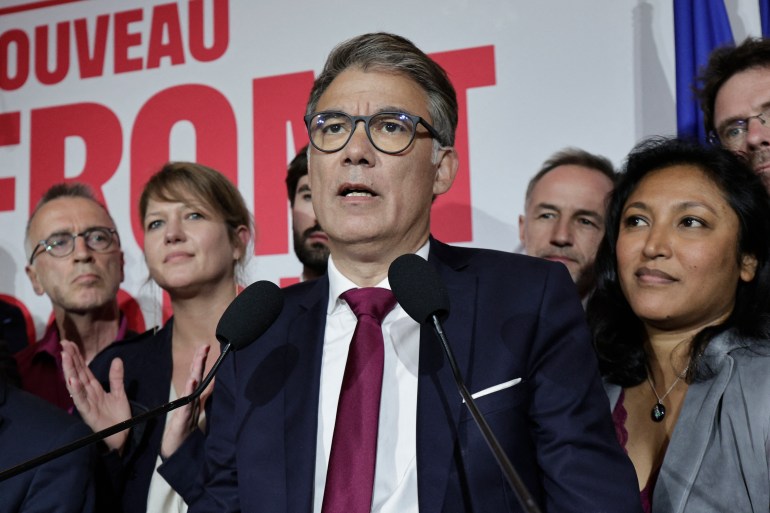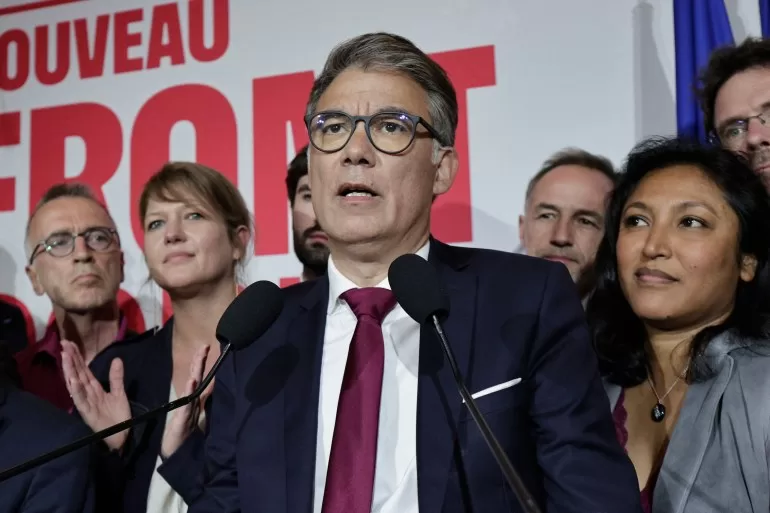France’s left-wing leader Jean-Luc Melenchon says the left is “ready to govern” after emerging as the largest political bloc in parliament, but the country faces a political deadlock as no party won a clear majority.
The New Popular Front (NFP) coalition led by Melenchon and its allies won a plurality in France’s National Assembly in the second round of the parliamentary elections on Sunday, taking 187 seats in the 577-seat National Assembly, interior ministry figures show.
The result delivered a blow to President Emmanuel Macron, whose centrist Ensemble alliance managed to win 159 seats. Marine Le Pen’s far-right National Rally (RN) and its allies surprisingly finished third with 142 seats despite a strong first-round showing.
With none of the top three alliances winning an outright majority of 289 seats needed to form a government, the eurozone’s second largest economy faces a hung parliament, uncharted territory in its modern age.
This may push Macron to either try to build a fragile coalition with moderates from the left and right or invite the left-wing NFP camp to lead the government. He may also resort to a technocratic government with no political affiliation to handle day-to-day affairs.
The fragmented results are set to weaken France’s role in the European Union and farther afield and make it hard for anyone to push through a domestic agenda.
“He [Macron] is in quite a difficult situation,” Rainbow Murray, a professor of politics at Queen Mary University of London, told Al Jazeera. “His party has fewer seats than it had before, but it’s still strong enough relative to the left for it not to be obvious for him to stand down either. So I think there are going to be some quite tense negotiations.”
“One of the key questions people are going to be debating is who is going to get to lead the next government.”
Who will be France’s next PM?
Prime Minister Gabriel Attal offered to resign Monday, but Macron asked him to stay on “for the time being in order to ensure the country’s stability”.
Al Jazeera’s Step Vassen, reporting from Paris, said Macron was likely to “take his time” and wait for the new political landscape to “settle in” before making major shifts.
The NFP alliance was quick to urge Macron to give it a chance to form a government. The coalition pledges to roll back many of Macron’s headline reforms, embark on a costly programme of public spending and take a tougher line against Israel because of its war on Gaza.
“According to the logic of our institutions, Emmanuel Macron should today officially invite the New Popular Front to nominate a prime minister,” said Green leader Marine Tondelier, one of a number of NFP figures seen as potential prime minister candidates.
“Will he or won’t he? As this president is always full of surprises, we’ll see,” she said on RTL radio.
Melenchon highlighted the potential for significant decisions to be made “by decree” on both national and international fronts, emphasising that recognising the State of Palestine would be one of their first actions “as quickly as possible”.
Macron back in February said he was open to recognition of a Palestinian state, but that such a move should “come at a useful moment” and not be “emotional.”
Will the NFP forge consensus?
It remains to be seen whether the NFP – a swath of leftist parties including Melenchon’s France Unbowed (LFI), the Socialist Party, the Greens and the Communist Party – can remain unified and agree on a path forward.

LFI lawmaker Clementine Autain said the alliance needed “to decide on a balance point to be able to govern”. She said neither former Socialist President Francois Hollande nor Melenchon, a controversial figure even within his own party, should serve as prime minister.
The leader of the Socialist Party, Olivier Faure, urged “democracy” within the left-wing alliance, which it said would choose a prime ministerial candidate within its ranks by the end of the week.
Raphael Glucksmann, co-president of the smaller pro-European Place Publique party in the alliance, said in the projections, “we’re ahead, but in a divided parliament, … so people are going to have to behave like adults.”
“People are going to have to talk to each other.”
In his first reaction, RN leader Jordan Bardella, Le Pen’s protege, called the cooperation between anti-RN forces a “disgraceful alliance” that he said would paralyse France.
Le Pen, who will likely be the party’s candidate for the 2027 presidential election, said, however, that Sunday’s elections, in which the RN made major gains, had sown the seeds for the future.
“Our victory has been merely delayed,” she said.
‘Cracks appearing’
Vassen said there are “cracks appearing” within the NFP camp that Macron may try to exploit for his own ends.
“This could be part of a strategy he [Macron] is playing to win some time,” Vassen said.
Macron, whose presidential term runs until 2027, called the shock snap elections shortly after support for France’s far right surged in European Parliament elections in June.
Rather than rallying behind Macron as he had hoped, millions of French people took the vote as an opportunity to vent their anger about inflation, crime, immigration and other grievances, including his style of government.
